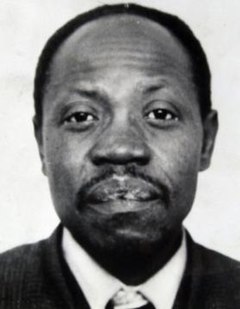Death of David Oluwale

David Oluwale c.September 1968
|
|
| Date | 4 May 1969 |
|---|---|
| Location | Leeds, West Riding of Yorkshire, England |
| Cause | Drowning |
| Burial | Killingbeck Cemetery, Leeds |
| Accused |
|
| Charges | |
| Verdict | Both cleared of manslaughter, perjury and GBH by direction of the judge. Both found guilty of ABH. |
| Convictions |
|
David Oluwale (1930 – 1969) was a British Nigerian who drowned in the River Aire in Leeds, West Riding of Yorkshire, in 1969. The events leading to his drowning have been described as "the physical and psychological destruction of a homeless, black man whose brutal, systematic harassment was orchestrated by the Leeds city police force." Oluwale's death resulted in the first successful prosecution of British police officers for involvement in the death of a black person. The precise sequence of events that led to Oluwale entering the river – whether he was deliberately thrown, chased or fell accidentally – have never been officially established, although two independent witnesses testified that they saw uniformed police officers chasing him alongside the river on the night he is believed to have drowned.
Oluwale's body was recovered from the section of the river between Knostrop Weir and Skelton Grange Power Station on 4 May 1969. The death was not treated as suspicious by the police or the coroner. In October 1970, a whistleblower within Leeds City Police revealed that Oluwale had been the victim of serious and sustained mistreatment by senior officers at Milgarth Police Station, Leeds, and an investigation, led by London's Scotland Yard, was opened. It was discovered that Oluwale had been subjected to "systemic, varied and brutal" violence by at least 2 officers, which "would often occur in the presence of other [officers], who made no effort to intervene."
In November 1971, former-Inspector Geoffrey Ellerker – by this time already serving a prison sentence for his involvement in covering up the circumstances of the death of a 69-year-old woman – and Sergeant Kenneth Kitching went on trial for the manslaughter of Oluwale. The trial received national media coverage, but justice and civil rights campaigners considered it to be a whitewash, presenting a deliberately negative portrait of Oluwale as "a wild animal" and "a menace to society", while failing to call any of the witnesses whose testimonies challenged this narrative. During the trial, the judge, Mr. Justice Hinchcliffe – who at one point described Oluwale as "a dirty, filthy, violent vagrant" – directed the jury to find the defendants not guilty of manslaughter, perjury and assaults occasioning grievous bodily harm. The jury returned unanimous verdicts of guilty relating to four assaults which took place between August 1968 and February 1969. Ellerker was sentenced to 3 years imprisonment, and Kitching to 27 months.
...
Wikipedia
